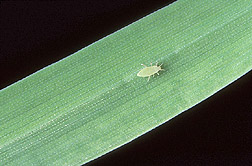This page has been archived and is being provided for reference purposes only. The page is no longer being updated, and therefore, links on the page may be invalid.
|
|
"Burton" Barley Fends Off Aphids
By Marcia WoodMarch 24, 2005
When they're attacked by Russian wheat aphids, leaves of vulnerable barley plants develop tell-tale white streaks and tight, corkscrew curls. These weakened plants produce fewer plump, nutritious kernels needed for feeding cattle or sheep, or for foods such as pearled barley for soups--or malt for making confections or brewing beer.
But an animal-feed barley named Burton, developed by Agricultural Research Service scientists and their university colleagues, resists attack by both kinds, or biotypes, of Russian wheat aphids that are found in this country. Leaves on Burton plants don't become streaked or curled when the green, one-sixteenth-inch-long aphids puncture them to feed on the plants' sap. Without the snug, rolled-leaf shelters, aphids become more vulnerable to their natural enemies, and more easily knocked off the plant by wind or rain, according to ARS plant geneticist P. Phillip Bregitzer. He works at the agency's Small Grains and Potato Germplasm Research Unit at Aberdeen, Idaho.
Bregitzer and plant geneticist Dolores W. Mornhinweg at the ARS Wheat, Peanut and Other Field Crops Research Unit, Stillwater, Okla., chose the sequence of parent plants for Burton barley. Those plants included two well-known, ARS-developed malting barleys, Crystal and Klages; a popular animal-feed barley known as Baroness, and a parent that Mornhinweg developed from a wild, Russian wheat aphid-resistant barley from Afghanistan.
Burton is named for former ARS entomologist Robert L. Burton, now deceased, who spearheaded much of the ARS Russian wheat aphid research from his Stillwater laboratory.
Researchers at the Colorado, Idaho, Nebraska and New Mexico Agricultural Experiment Stations collaborated to make Burton available to growers in 2004. Seeds of this plant, described technically as a hulled, two-rowed spring barley, are still available in limited quantities from the University of Idaho's Foundation Seed Program, 3793 N. 3600 E., Kimberly, Idaho 83341, phone (208) 423-6655.
ARS is the U.S. Department of Agriculture's principal scientific research agency.

